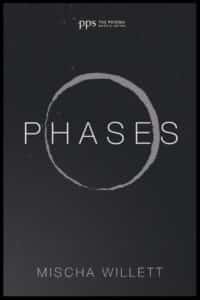In his new collection Phases, poet Mischa Willett reaches back to the distant past of classical antiquity and the recent past of old girlfriends and a father recovering from heart surgery, to paintings and sculpture, to a young child asking about the inequality of large and small cars. While that sounds like a diverse array of subjects and inspirations, Willett ties these 60 poems together with a few deep, resounding themes and perspectives.
A glance at the table of contents reveals one of those perspectives—the geography of the collection. Willett has structured the poems into nine sections: oceans, lands, seas, and an island. This geography is specific: “Ocean of Storms,” “Sea Has Become Known,” “Land of Heat,” and so on. We navigate this geography, and it is sometimes calm and reflective, and sometimes stormy and disruptive.
Not all stormy poems are loud, however. Here is a softer one from the “Ocean of Storms” section.
I thought about those green
beans and onions all day
after having rejected them
for more orange chicken
on my weekend trip to the mall.
The regret eats me indelicately.
How differently…
Now I’ll blow around
like street trees: pretty, but
roots not deep enough to reach
the good water.
I rerun the movie
of you driving through
the night alone, and all
night long.
A poem about regret starts with bad diet choices but quickly becomes a story of a lost relationship. And it happens so suddenly that what is almost missed is that bad decisions can be made in both food and relationships, especially those relationships that look solid (“pretty”) but don’t have the roots for long-term sustenance.

Mischa Willett
In the Notes section at the end, Willett says this about the poem: “Regret takes many forms, does it not? Blows out all proportions. The Italian poet Dante Alighieri knew something about how it eats you up.”
The Notes section is not to be overlooked. Some notes provide short background information on a poem and its origin, some explain certain terms, and some are wry observations. These are not the footnotes you’re accustomed to.
Willett teaches English at Seattle Pacific University. He specializes in 19th century British poetry and also teaches Shakespeare, C.S. Lewis and the Inklings, and creative writing. He received his B.A. degree from Wheaton College, his M.A. degree from Northern Arizona University, and his M.F.A. and Ph.D. degrees from the University of Washington.
Phases is a new volume in Wipf and Stock’s Poiema Poetry Series. It’s also the poet’s first collection; several of the poems have been previously published in literary journals. The poems cover history and technology, art and heartache. They’re filled with flashes of insight and understanding. It’s a brilliant collection, and I don’t often use the word “brilliant.”
Related: Mischa Willetts reads “Mnemonic Influence”
Photo by pbkwee, Creative Commons, via Flickr. Post by Glynn Young, author of the novels Dancing Priest and A Light Shining, and Poetry at Work.
__________________________

“I require all our incoming poetry students—in the MFA I direct—to buy and read this book.”
—Jeanetta Calhoun Mish
- Poets and Fables: Steven Flint and “The Sun and the Boy” - July 3, 2025
- Poets and Poems: Alison Blevins and “Where Will We Live if the House Burns Down?” - July 1, 2025
- Poets and Poems: Paul Pastor and “The Locust Years” - June 26, 2025


Bethany Rohde says
Effective opening lines:
“I thought about those green
beans and onions all day”
They’re working on me in a similar way. It was still morning when I first read this, so I wasn’t in the mood to think about steamed veggies. But now I keep ruminating, about a speaker who keeps ruminating, about the produce he passed up.
Intersting how he does his Notes section, I’d like to see that.
Glynn says
It’s like a footnotes section, like you would see in a non-fiction work. He’s annotating the poems — and all poems come from somewhere.
Sandra Heska King says
“The regret eats me indelicately.”
I like how he titled this and then referenced Dante in his notes to give me more to think about. Liked hearing him read, too.
Glynn says
I really enjoyed this collection.